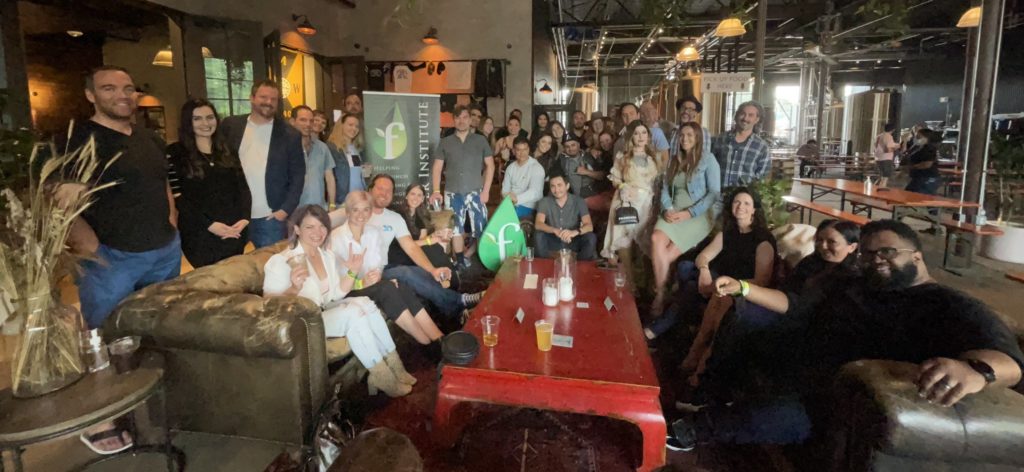
So you want to work for a startup…
This month in Texas, the startup ecosystem is heating up faster than a Texas summer, so my mind is turned the increasing networking going on, fueled by the light at the end of the tunnel of quarantine AND the fact that the world seems to be moving here. Last week, an incredible Founder Institute get together… this week, Houston Tech Rodeo has Texas’ most substantial startup programs together… and next week, San Antonio hosts a Tech District Rally with TechBloc. MediaTech Ventures is wrapping up two concurrent cohorts and is onboarding new countries developing startups into the United States.
With all that going on, Austin Digital Jobs, Austin’s largest job community, seeded a question from the community, “I have a lil more than 3 years of SEO experience and have worked for agencies before. Now I have 2 in-house offers that I have to choose from, one with a startup and one with a big e-commerce brand.”
Should you work for a startup?
Startups fail. It’s what they do. No one should ever “take a job with” a startup without fully appreciating that you will probably (VERY LIKELY) be in search of another gig in months.
People reading this may not appreciate my point, “WTF says and encourages that startups fail?!”
They do.
Almost EVERYTHING in the startup sector fails. The work we do in startups is the R&D of the economy, it’s the innovation, the change… just like experimentation or invention, most of it is wrong. <- that’s the mindset to have.
74% of all funded startups (so even with MONEY and investors) fail.
Gone.
Poof.
People, like me, work with startups because we love working with entrepreneurs, NOT because it’s a good job or solid career. So should you take a job at a startup? NO.
But let me clarify. If you want to work in startups, work in startups. Don’t perceive and expect it as you would a JOB at a company. You can work for Dell. When you work for startups, you don’t really work AT a startup, you’re just there now, until the next one.
What alarms me in a question like that which was asked, an SEO role, is that it’s too distinct a position.
Let me share that I am you. 20 years ago, I was the SEO and I was leaving Yahoo & HP to work for startups. My online profile is seobrien because of that era of internet innovation.
What matters is startups is that everyone can do everything (more or less). I made the leap into startups, the first thing clear was that SEO wasn’t going to matter any time soon (and startups need soon, they don’t have months), so we went headfirst into social media, Adwords, a ton of content, and PR about the founders. We did SEO, but the SEO didn’t really make much difference. Had they hired me to just do that, they would have failed. What mattered was that they brought in someone who could do Marketing WHICH INCLUDES SEO.
Besides, an SEO job??
We discovered more than a decade ago that no startup should ever build itself on Google or SEO. Forget the fact that the startup is likely to fail, SEO won’t save it. And more importantly, you know this, you work in the sector, Google is going to change things next month (or next week, or tomorrow), and a “startup” has no brand, no social media, little PR, and no domain strength, so when Google changes things, the startup tanks… and everyone is looking at you.
What should concern us foremost is that a startup is hiring for a specific thing – and that tells me they’re probably going to fail, without even knowing them.
Work FOR startups, not at a startup
I ended up being one of the “startup marketers” and because this stuff is really rather simple, I would work with a few at the same time. FOR startups, not at a startup. That way, if/when one failed (as more than 2 out of 3 do, no matter what), I was still working for startups. Move on to add then next one.
While you’re doing that, you chalk up the wins…. Investors appreciate your impact… and the fact that some don’t work out is irrelevant because that’s normal – saving both your reputation and career AND building you a great network of grateful startup founders and investors, in the wins.
How do you take one or the other when underqualified to work for startups? You do the work and drive results. Period.
That’s what matters in this space. Not talking, not planning, not meetings, not advice. Show up and get it done.
My concern and encouragement is that if you go the startup route, that showing up and getting it done has to mean FAR more a role, it’s not a job, it’s a passion; build your personal brand and reputation quickly, so that you have startups (with an S) under your belt and increasingly interested in what you do.
Startups fail… and you won’t get far working with startups if you have a couple on your resume that both failed after 12 months (as is likely to happen); you want to develop your brand as ideal for startups, and to do that, you get into a few and start hitting wins by doing whatever it takes to make them more likely to NOT fail.




Thanks for always being your authentic self, Paul. You’re spot on that it’s more of a calling than a job. And an adventure!
My adventure needs to take more trips to exotic locations
love the way you had narrated. Tributes the post to my team, who helped me driving along the runway. Tha Rhee Istiaque Ahmed Nabil Rakibul Hasan Mizan Moslem
Thanks to Jessica Dixon Kate Padget-Koh having your back always.
Great post!
Paul- Absolutely agree with your points. This is Why (like myself) many from Silicon Valley & other Startup ecoSystems have ‘non-normal’ resumes. I recall that Bob Metcalf labeled such people as “founderatis” as without others willing to take a risk, Founders would not have companies.
http://siliconhillsnews.com/2013/05/18/bob-metcalfe-wants-austin-to-be-a-better-silicon-valley/?fbclid=IwAR0LI7XKXGvsjGuqMn7LRZKAMl9l4QSo8K2x2XcmZBpqIO-L0KjGr9M8DRk
Love that.
There really needs to be a LinkedIn for startup workers.
Paul O’Brien Austin needs secretaries, janitors, & other non-management people to be able to brag about their startup experience & success @ catching the Brass Ring. Multiple stories like this in Bay Area, particularly ‘back in the day’!!
Paul, working in startups takes a different passion, energy, and drive. The way an ecosystem thrives is to embrace the fact that so many startups fail and to take those learnings on to the next one and the one after that. This holds whether you are a founder, employee, investor, or advisory.
I agree that things are heating up and its getting exciting.
Real truths. I really don’t even think people ought to think of them “businesses” or “startups”. Rather, think of them as “challenges”. Not only are they likely to fail for founders, it’s hard to get hired by one too. So why even bother? For me at least, it’s the intellectual challenge.
Mark Biw I’m inclined that way. Big fan of Blank’s definition of a startup, “a temporary venture”
Truly great guidance! But OMG… I’m beyond confident that the percentage of failure can be adjusted down for a much more efficient rate of achieving greater stablility and flex forward. Very exciting to think about opps in that direction! Crikey, Paul, you are an inspiration!
Agree entirely that percentage of failure can be adjusted down; we know that entirely by way of age data (40 year olds tend to succeed more among startups), showing that experience, network, and resources, mitigate risk.
What’s your thought though, in startups, that stability helps? I tend to find that an effort to maintain stability, being uncomfortable with change, is what gets in the way; that startups must be unstable, and protected from the downside risks of people who don’t work out.